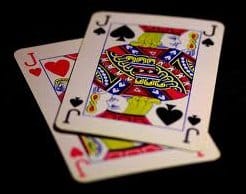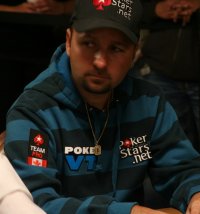Three Ways to Play Jacks

 I have friends who frequently discuss our recent poker hands. We have a running joke that there are three ways to play pocket jacks, and they are all wrong. This is kind of our universal explanation for when we get in a hand that we were destined to lose no matter what we did. For instance, we’ve all shoved on the flop with an overpair only to be called by two overcards or a flush draw. We 3bet or 4bet pre-flop and the guy still called with garbage and flopped a monster. That’s just how the game works.
I have friends who frequently discuss our recent poker hands. We have a running joke that there are three ways to play pocket jacks, and they are all wrong. This is kind of our universal explanation for when we get in a hand that we were destined to lose no matter what we did. For instance, we’ve all shoved on the flop with an overpair only to be called by two overcards or a flush draw. We 3bet or 4bet pre-flop and the guy still called with garbage and flopped a monster. That’s just how the game works.
I enjoy discussing poker hands and strategies almost as much as I enjoy playing the game itself. How many times per session do you ask yourself, “What did he think I had?” or “What was he hoping for?” Well, unlike in many sports where you seldom get a coach to give much insight, poker players actually enjoy discussing their strategies.
I feel that even when you’re helping other players, this analysis improves our own game. That being said, I think it’s really important to accept that there is never a truly correct way to play a hand. There is no perfect amount to raise or exact figure for a good value bet. Even if a hero call of a bluff wins, it isn’t necessarily the right play at that particular time.
Another thing to think about is that certain styles of play just don’t fit an individual’s personality. Some players are naturally conservative and get out of their comfort zones playing recklessly and don’t play their best. The opposite is true for others, who blow up after trying to be unusually patient for several orbits. I want to discuss a couple different scenarios, both how I would play them and what conventional wisdom says, and let you discuss.
Say you’re in a tournament with an average stack and you flop four to a flush with two overcards. There is a bet and a call in front of you. Now, we know we likely have a good chance to win the hand with up to 15 outs. There is clearly enough money in the pot to make this call mathematically.
The problem is that in a tournament situation, you can make the argument to throw pot odds out the window. If you’re getting 10:1 on your money, but 50% of the time you get eliminated, do the pot odds matter? In tournaments, you’re paid based on your survival and not necessarily how many chips you have. You can make an argument for either decision here.
A spot in a tournament that a lot of people struggle with is when they are right on the verge of the short stack. Let’s say you have 11 to 20 big blinds, which will almost always be a below average stack. Some top players recommend that it becomes all-in or fold at this point. You shove because you still have enough equity to make others fold or you fold because you don’t have enough chips to miss many flops.
 I know pros like Daniel Negreanu (pictured) who like to do the opposite and play as many small pots and possible, giving themselves more chances to actually hit something they like. I personally try both strategies depending on what point we are at in the tournament. If it’s really early and I’ve got a long way to go, then I go for the homerun, but if it’s near the bubble, I may try to hold on for good spots. You have to do what works best for you.
I know pros like Daniel Negreanu (pictured) who like to do the opposite and play as many small pots and possible, giving themselves more chances to actually hit something they like. I personally try both strategies depending on what point we are at in the tournament. If it’s really early and I’ve got a long way to go, then I go for the homerun, but if it’s near the bubble, I may try to hold on for good spots. You have to do what works best for you.
I’m sure many cash players have had the thought cross their minds that they would be better off just folding A-A pre-flop. One of the cool features of online hand tracking programs is that you can see how you do with specific hands. I know over stretches in my game that I’ve been very unprofitable playing A-K and A-Q, and even slightly unprofitable playing A-A and K-K.
You can make the case sometimes that you only seem to win small pots and lose big ones. I can make the argument that it’s clearly not the hand you’re playing, but possibly the way you play the hand if you’re losing long-term. This is a fun one to discuss and we’ve all lost huge pots with aces. However, premium hands are definitely profitable long-term and hands that you should never fold pre-flop.
Mixing up your play is something that pretty much everyone agrees you need to do. You have to keep your opponents guessing or you’ll never get any action on your big hands and you’ll never get anyone to fold when you don’t have it. There are multiple ways to go about this.
 Some people like raising different amounts with the same hand or raising with certain hands sometimes and limping with them other times. These are all ways to go about it. Another way to mix it up is to treat every hand the same. If you make the same raise with 6-5 suited as you do with K-Q, then you’ve mixed up your play by playing different hands the same. One of Phil Ivey’s (pictured) claims to fame is that he plays every hand fearlessly and, therefore, you never know what he has.
Some people like raising different amounts with the same hand or raising with certain hands sometimes and limping with them other times. These are all ways to go about it. Another way to mix it up is to treat every hand the same. If you make the same raise with 6-5 suited as you do with K-Q, then you’ve mixed up your play by playing different hands the same. One of Phil Ivey’s (pictured) claims to fame is that he plays every hand fearlessly and, therefore, you never know what he has.
Poker discussion is one of the greatest learning tools we have as players. We all need to realize that it is a game of incomplete information at the time we make our decisions. It may seem like an obvious play in hindsight, but you can’t explain every detail in a forum about table image or other circumstances that affected your play.
We all can benefit from trying to be as objective as possible when considering other ways to play certain situations. You may find different gears to your game that will be beneficial. Each of us has a responsibility to be a constructive with our input and I think it will help us once we realize that there is not perfect play all the time.
Check out the Poker Discussion forum for even more poker strategy.